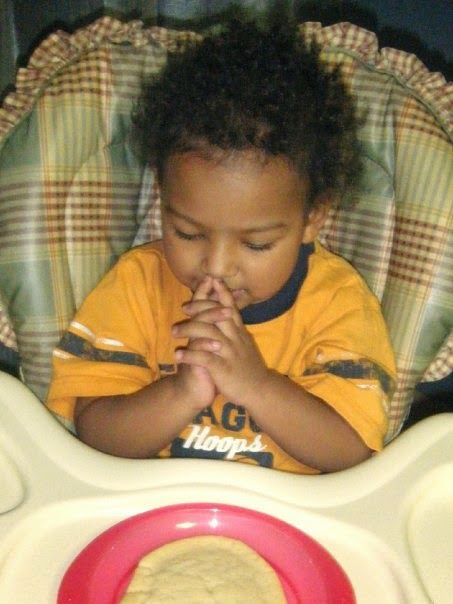Teach Your Child How to Pray

|
Getting your Trinity Audio player ready...
|
 Therefore Eli said to Samuel, "Go, lie down; and if he calls you,
Therefore Eli said to Samuel, "Go, lie down; and if he calls you,
you shall say, 'Speak, LORD, for your servant is listening.'" So
Samuel went and lay down in his place. (1 Samuel 3:9 NRSV)
A few months ago, there was a story in the news that went viral about
a little boy who sung Hezekiah Walker's "Every Praise" while held
captive by a deranged man. The man eventually let the boy go unharmed,
and the police returned him to his family. The boy said the man let
him go because he kept singing. The story intrigues me because the boy
was able to draw from his faith in God to help him endure the scariest
moment in his life. But what if he didn't have anything to draw from?
Our children and teens face so many pressures and difficulties. Not
only do they have to worry about pressure from their immediate peer
groups or the people they see every day, but thanks to social media,
their successes and mistakes are played out on a global stage for
everyone to see and criticize. I remember the embarrassment of being
made fun of in school. I dreaded going to class the next day. Imagine
what it's like for youth today who can't escape the online jeers and
taunts. Their embarrassing moments are circulated indefinitely on the
internet and made into memes. There's no place to hide.
That's why it's imperative as believers that we equip our children and
teens with what they need to make it through the difficulties of life.
That's why we need to teach our young people how to pray.
Prayer doesn't have to be some "super-spiritual," ritualistic act.
You're probably thinking, "I don't want my child being made fun of for
being a 'Jesus freak' or for being 'super-spiritual!'" I understand.
But prayer doesn't have to be some "super-spiritual," ritualistic act.
Teach your children that prayer is merely a conversation with God.
Prayer is a conversation with God.
1 Samuel 3 is one of my favorite chapters in the Bible because I love
how Eli teaches Samuel as a young boy how to recognize the voice of
God. In the same way, we can teach our young people how to hear God's
voice and how to respond. In the text, God wanted to initiate a
conversation with Samuel, but he didn't know how to recognize His
voice. Samuel thought it was his mentor, Eli, calling his name.
We, too, can let our young people know that God wants to initiate a
conversation with them. We begin by telling them God wants to direct,
encourage, inspire, and enlighten them. However, if they don't take
the time to start the conversation, they will not reap the benefits of
hearing from God.
Can you hear me now?
We also need to teach our children to pray because it will help them
learn how to discern God's voice from the other voices. There are so
many voices in the world attempting to lead our children in all kinds
of ungodly directions. If we start early by teaching our children how
to discern God's voice, we won't have to worry so much about them
falling prey to contrary voices. Eli knew this concerning Samuel.
If you want to teach your children how to pray, you can start by doing
the following:
Lead your family in devotions and prayer. Take turns speaking to
God with your children.
Teach your children simple prayers. Try prayers like the nighttime
prayer "Now I lay me down to sleep. I pray the Lord my soul to keep."
This will help get your children acclimated to speaking to God.
Teach them how to offer prayers of thanksgiving, especially during
mealtimes. Saying "grace" over a meal may seem miniscule, but it is a
reminder that God is involved in our lives.
Give your child or teen a journal to write down prayers. Teach
them that prayers don't always have to be vocalized. They can write
prayers to God and they will be just as effective.
In time, if you nurture their spiritual life, your children's prayer
life will blossom from rote memorization to a prayer life overflowing
with living water and saturated in devotion.





